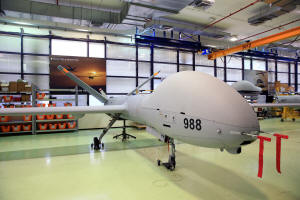Israeli drones use free-falling bombs, can carry up to a ton
 Send a link to a friend
Send a link to a friend
 [February 02, 2023]
By Dan Williams [February 02, 2023]
By Dan Williams
TEL AVIV (Reuters) -Israeli armed drones use gravity bombs that produce
no noise or smoke as they fall, making them hard for enemies to
anticipate or evade, and the largest model of the aircraft can carry up
to a tonne of munitions, the military says.
After more than two decades of secrecy, Israel in July went public with
the existence of armed drones in its arsenal. In November, an Israeli
general detailed the two corps - air force and artillery - that operate
the systems in combat.
Such drones are remote-piloted, dropping bombs or carrying out
surveillance before returning to base. They are distinct from the
kamikaze drones that Iran said were used in a weekend attack on a
defence plant in Isfahan - an incident on which Israel has declined to
comment.
Briefing Reuters, a senior Israeli military officer said the armed drone
fleet includes the passenger plane-sized Heron TP, made by state-owned
Israel Aerospace Industries Ltd, and Elbit Systems Ltd's smaller Hermes.

The former, the officer said, "is the heaviest drone that the IDF
(Israel Defence Forces) has, which can carry munitions, with an
effective payload of around a tonne".
The Israeli manufacturers do not publicise the armed capabilities of the
drones, under what industry sources have described as a Defence Ministry
secrecy policy.
[to top of second column]
|

An Elbit Systems Ltd. Hermes 900
unmanned aerial vehicle (UAV) is seen at the company's drone factory
in Rehovot, Israel, June 28, 2018. REUTERS/Orel Cohen

The officer, not identified in line with military requirements given
the sensitivity of the subject, said any sales of bomb-capable
drones would be government-to-government, negating the need for
publicity.
All the drone munitions are Israeli-made, the officer said, and
"come down in free-fall, and can reach the speed of sound".
Such bombs would not have propulsion systems that generate the
tell-tale noise and smoke of fuel afterburners.
The officer declined to give further details on the munitions,
saying only that, by design, when an armed drone attacks "no one
will hear it, no one will see it coming".
This would assume enough altitude so that the drones' propeller
engines can not be clearly heard on the ground, however.
In winter wars, like Israel's in Gaza in 2008-2009, the drones have
to be flown below the clouds for their targeting cameras to work,
meaning they might be heard.
"You lose the element of surprise," the officer said.
(Writing by Dan Williams; Editing by Robert Birsel)
[© 2023 Thomson Reuters. All rights
reserved.]This material may not be published,
broadcast, rewritten or redistributed.
Thompson Reuters is solely responsible for this content. |